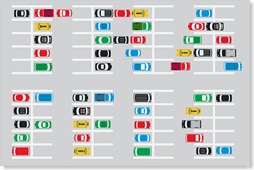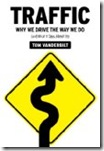Feeling Safe Kills
From "Slow-Moving Vehicle," a New York Times review of Traffic by Tom Vanderbilt:
Traffic jams are not, by and large, caused by flaws in road design but by flaws in human nature. While this is bad news for drivers — there’s not much to be  done about human nature — it is good news for readers of Tom Vanderbilt’s new book. “Traffic” is not a dry examination of highway engineering; it’s a surprising, enlightening look at the psychology of human beings behind the steering wheels.
done about human nature — it is good news for readers of Tom Vanderbilt’s new book. “Traffic” is not a dry examination of highway engineering; it’s a surprising, enlightening look at the psychology of human beings behind the steering wheels.
...Nowadays, the cause of collisions, or one of them, is people believing they’re better drivers than they are. We base our judgment on the number of crashes we’ve been in, rather than on the number of accidents we narrowly avoid, which, if we’re being honest (or we’re being me), happen just about every time we drive.
 Compounding this vehicular hubris is the fact that most of the driving we do appears to be safer than it is. Driving rarely commands 100 percent of our attention, and so we feel comfortable multitasking: talking on the phone, unfolding a map, taking in the Barca-Lounger on the road’s shoulder. Vanderbilt cites a statistic that nearly 80 percent of crashes involve drivers not paying attention for up to three seconds. Thus the places that seem the most dangerous — narrow roads, hairpin turns — are rarely where people mess up. “Most crashes,” Vanderbilt writes, “happen on dry roads, on clear, sunny days, to sober drivers.” For this reason, roads that could be straight are often constructed with curves — simply to keep drivers on the ball.
Compounding this vehicular hubris is the fact that most of the driving we do appears to be safer than it is. Driving rarely commands 100 percent of our attention, and so we feel comfortable multitasking: talking on the phone, unfolding a map, taking in the Barca-Lounger on the road’s shoulder. Vanderbilt cites a statistic that nearly 80 percent of crashes involve drivers not paying attention for up to three seconds. Thus the places that seem the most dangerous — narrow roads, hairpin turns — are rarely where people mess up. “Most crashes,” Vanderbilt writes, “happen on dry roads, on clear, sunny days, to sober drivers.” For this reason, roads that could be straight are often constructed with curves — simply to keep drivers on the ball.
This basic truth — feeling safe kills — lies beneath many of the book’s insights...
...S.U.V.’s are more dangerous than cars. Not just because they’re slower to stop and harder to maneuver, but because — by conferring a sense of safety — they invite careless behavior.





